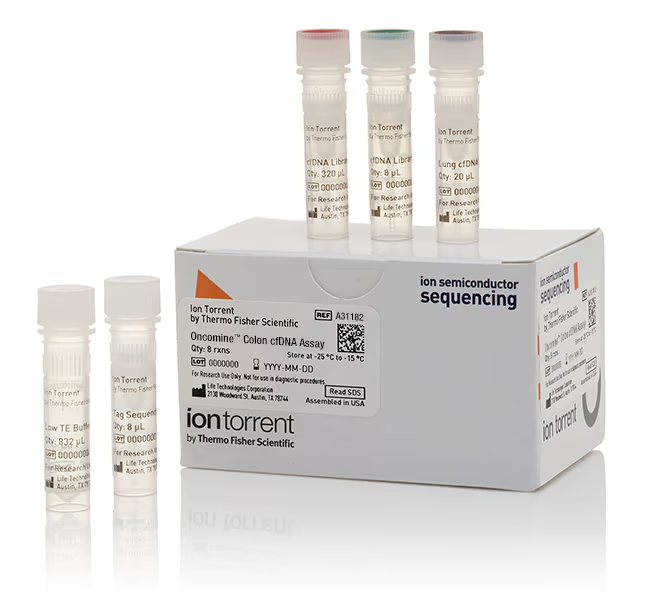
The Oncomine™ Colon cfDNA Assay is part of a complete solution to detect colon (or other related gastro-intestinal) tumor-derived DNA (ctDNA) in cell-free DNA (cfDNA). It provides the reagents for library construction and a single pool of multiplex PCR primers for preparation of amplicon libraries from cfDNA obtained from the plasma fraction of a single tube of whole blood. The assay enables the analysis of single nucleotide variants and short indels that are frequently mutated in colon/gastro-intestinal cancers. Fourteen genes with >240 hotspots are covered (Genes: AKT1, BRAF, CTNNB1, EGFR, ERBB2, FBXW7, GNAS, KRAS, MAP2K1, NRAS, PIK3CA, MAD4, TP53, APC). Through the use of tag sequencing technology, a limit of detection (LOD) down to 0.1% can be achieved.
Note: Target and hotspot BED files and User Guide document for cfDNA Variant Analysis with Torrent Suite Software 5.2 can be found below under 'Documents'.
• Optimized short amplicon design for fragmented cfDNA (∼170 bp in length)
• Detection of both single nucleotide variants (SNVs) and hotspot indels down to 0.1% LOD
• Very high sensitivity and specificity, enabling extremely low levels of detection with minimal false positives
• 6 samples can be run on an Ion 530™ Chip, reducing overall sequencing costs
• Efficient workflow, from a single tube of blood to results in just 2 days
Liquid biopsies offer several advantages over conventional solid tumor biopsies:
• Liquid biopsies are less invasive, enabling samples to be taken at multiple time points to monitor progression
• Lower cost compared to traditional tissue biopsies
• Faster turnaround time from sample to results
• More tumor heterogeneity captured
The entire workflow (figure below) from isolation of cfDNA using the MagMAX™ Cell-Free DNA Isolation Kit to analysis of samples can be accomplished in just 2 days using the Ion S5™ XL sequencing system.
Technology
ctDNA is found at extremely low concentrations in the plasma fraction of whole blood. Because of this low prevalence, a tag sequencing technology is utilized in this assay. The technology attaches a unique molecular tag to the gene-specific primers. The amplified products are then grouped into families containing the same tags. Families that contain the same mutant variant will be called with optimized Variant Caller settings for the Oncology-Liquid Biopsy application. Families that contain random errors, typically generated through the library construction/sequencing process, are identified and removed from variant calling.
Unlike other technologies with LODs of 1-5%, the Oncomine Colon cfDNA Assay has a flexible detection limit down to 0.1% or 1 mutant copy in a background of 1,000 wild-type copies. To achieve 0.1% LOD, 20 ng of input cfDNA is required. Lower amounts of cfDNA can be used (down to 1 ng), but the LOD will be higher depending on the input amount.
Simplicity, speed, and scalability of tag-sequencing technology
The Oncomine Colon cfDNA Assay enables cancer genetic studies from just 1 ng of input cfDNA for targeted library construction. The cfDNA assay uses standard PCR equipment and two simple PCR reactions, one to attach the unique molecular tags and the second to amplify the library, for high multiplex PCR-based target selection with no need for extensive capital investment. Additionally, the Oncomine Colon cfDNA Assay is compatible with FFPE samples for possible concordance studies. Total time to targeted libraries is just 3.5 hours. Scalability and flexibility are achieved using the Tag Sequencing Barcode Set 1-24 (Cat. No. A31830) or Taq Sequencing Barcode Set 25-48 (Cat. No. A31847) for multiplexing barcoded samples on Ion S5 chips.
Learn more about Oncomine cfDNA Assays >
| Code | Description |
|---|---|
| A31182 | Catalog Number: A31182 |

